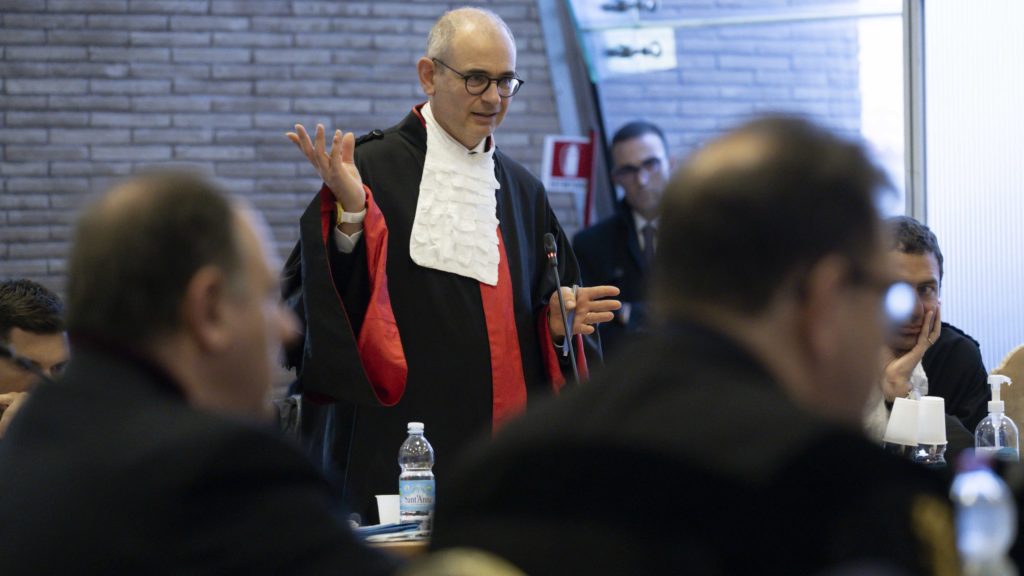Cardinal Angelo Becciu, who is on trial at the Vatican for financial malfeasance, tried to get Pope Francis to sign statements saying the cardinal acted with the pope's approval when he used Vatican money to invest in a property in London and when he paid a woman who claimed she could help secure the release of a kidnapped nun.
"I regret to inform you that I cannot comply with your request," Pope Francis wrote in a letter to the cardinal dated July 26, 2021.
Alessandro Diddi, the Vatican prosecutor, entered correspondence between the pope and Cardinal Becciu into evidence March 9 during the 50th session of the trial, which began one day after the pope declined to sign the statements that could have absolved the cardinal.
The prosecutor read the correspondence out loud to the court and projected copies of the letters on the wall of the makeshift courtroom set up in the Vatican Museums to accommodate the 10 defendants and their lawyers.
Diddi told the court that he secured copies of the letters from the pope and had the pope's authorization to enter them into evidence.
The first letter from the pope was dated July 21, 2021, and referred to a letter -- not entered into evidence -- written by the cardinal the day before.
Pope Francis said he was "surprised" by the cardinal's July 20 letter and, the pope said, he had no intention of getting involved in the "procedural 'strategies'" Cardinal Becciu seemed to be planning.
The pope also used the letter "to clarify, in the spirit of truth," that he did remember Cardinal Becciu presenting to him the idea of investing in property in London's chic Chelsea neighborhood, but he also remembered thinking the plan "seemed strange to me," which is why he told the cardinal before proceeding to consult with Cardinal Pietro Parolin, Vatican secretary of state, and with Jesuit Father Juan Antonio Guerrero Alves, then-head of the Vatican Secretariat for the Economy.
The Vatican lost millions of euros on the property deal.
Diddi also entered into evidence a follow-up letter from Cardinal Becciu dated July 24, 2021.
Earlier that day, the court heard in November, Cardinal Becciu and a relative of his secretly recorded a phone call with Pope Francis during which the cardinal tried again to convince the pope to tell the court he had authorized the cardinal to spend Vatican money to ransom Sister Gloria Cecilia Narváez, a Colombian nun kidnapped in 2017 by militants in Mali.
Cardinal Becciu wrote to the pope, "I have been accused by the magistrates of having cheated you both in the affair of the Colombian sister kidnapped in Mali and for the proposal to acquire the building in London."
"I should subpoena you as a witness in the trial, but I would not allow myself to do so," the cardinal wrote to the pope July 24. However, he added, he needed two statements from the pope confirming what happened.
The cardinal attached the two statements he wanted the pope to sign.
"Evidently and surprisingly, I have been misunderstood by you," the pope wrote in response July 26, saying he had no intention of signing the statements.
The letters from the pope confirmed that Pope Francis authorized Cardinal Becciu to hire a professional firm to help ransom Sister Narváez, but he objected to the characterization that he authorized the cardinal to hire an Italian woman, Cecilia Marogna, to help.
Marogna, who also is on trial for embezzlement, has described herself as a security analyst and claimed she worked for the Italian intelligence service. Through a humanitarian organization Marogna registered in Slovenia, Vatican analysts said Cardinal Becciu sent her several Vatican bank transfers amounting to 575,000 euros (more than $600,000 today). Investigators said Marogna spent the money on personal travel and buying luxury goods.
Sister Narváez was freed in October 2021; no evidence has been presented to suggest the payments sent to Marogna had any effect on the nun's release.

